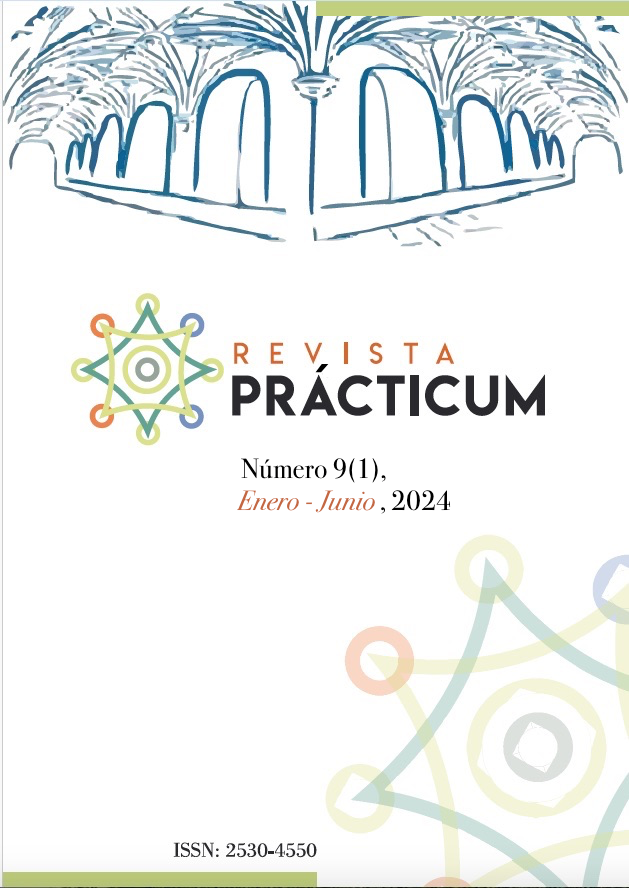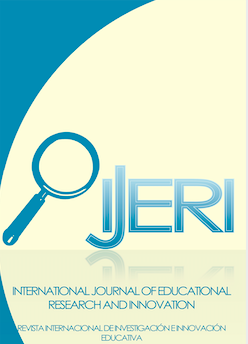Digital competences in the Practicum: State of the art
DOI:
https://doi.org/10.24310/rep.9.1.2024.17064Keywords:
Digital competence, Systematic review, PracticumAbstract
In this paper we conducted a systematic review of the development of Digital Competence during the Practicum in the professional training pathway. To this end, seven databases of documents published in the last five years were consulted. The aim is to identify the ways in which this competence is deployed and promoted through the professional practices in the field that are proposed from different experiences. In this search, the technique of content analysis is used to recognise thematic recurrences and to be able to make semantic groupings. The study reveals a need for students (future professionals) to strengthen the development of Digital Competence in order to be in a position to integrate it into the Practicum (and their future work performance). Also striking is the absence of research on the other actors in the Practicum (tutors), which indicates a gap in the topic.
Downloads
Metrics
Publication Facts
Reviewer profiles N/A
Author statements
Indexed in
-
—
- Academic society
- N/A
- Publisher
- Universidad de Málaga
References
Ala-Mutka, K. (2011). Mapping digital competence: Towards a conceptual understanding. Sevilla: Institute for Prospective Technological Studies, 7-60. ftp://s-jrcsvqpx102p.jrc.es/pub/EURdoc/JRC67075_TN.pdf
Alsina Tarrés, M., Masardo, A. y Mallol Macau, C. (2021). Online reflective practice among peers during the teaching practicum in a transnational project. Revista de Docencia Universitaria, 19(2), 149-168. https://doi.org/10.4995/redu.2021.15138
AlFawaz, I. y Alrasheed, A.A. (2023). Experiences with telemedicine among family medicine residents at king saud university medical city during the COVID-19 pandemic: a cross-sectional study. BMC Medical Education, 23(1), 313. https://link.springer.com/article/10.1186/s12909-023-04295-0
Amorós-Poveda, L. (2020). Competencia digital docente en Prácticum desde la autoevaluación. Revista Practicum, 5(2), 30-46. https://doi.org/10.24310/RevPracticumrep.v5i2.10235
Aranda Vega, E.M., Martín Cuadrado, A.M. y Corral Carrillo, M.J. (2020). Diarios de clase: estrategia para desarrollar el pensamiento reflexivo de profesores. Educación y Educadores, 23(2), 243-266. https://doi.org/10.5294/edu.2020.23.2.5
Aristizabal Llorente, P. y Cruz Iglesias, E. (2018). Desarrollo de la competencia digital en la formación inicial del profesorado de Educación Infantil. Pixel-Bit, 52, 97-110. https://idus.us.es/handle/11441/68940
Bergvall, H., Larsson, C., Strålin, E. E., Bohman, B., & Alfonsson, S. (2023). Perceived effects of the COVID-19 pandemic on clinical psychology internships in Sweden. BMC Medical Education, 23(1), 249. https://link.springer.com/article/10.1186/s12909-023-04236-x
Carvajal Romero, S. (2018). Competencia digital en la formación del profesorado en matemáticas. Tesis de Doctorado. Universidad de Barcelona. https://www.ugr.es/~fqm126/tesis/tesis_carvajal.pdf
Castro-León, E., Íñigo Mendoza, V., Nestares Hervías, E.M. y Escribano Valle, J. (2020). El fortalecimiento de la competencia digital en el Máster en Formación del Profesorado mediante la curación de contenidos y la creación de recursos educativos digitales. En E. Sánchez Rivas, E. Colomo Magaña, J. Ruiz Palmero y J.
Sánchez Rodríguez (Coords.). Tecnologías educativas y estrategias didácticas (pp.1585-1594). UMA. https://hdl.handle.net/10630/20345
Cebrián-de-la-Serna, M. (2017). Recursos tecnológicos para un PLE-portafolios multimedia de calidad para el prácticum y las prácticas externas. En XIV Symposium Internacional Recursos para un Prácticum de Calidad. 5-7 Julio, Poio. Pontevedra, España. pp. 35-48. http://reppe.org/wp-content/uploads/2016/06/actas17.pdf
Cebrián de la Serna, M. (2018). Modelo de evaluación colaborativa de los aprendizajes en el prácticum mediante Corubric. Revista Practicum, 3(1), 62-79. https://doi.org/10.24310/RevPracticumrep.v3i1.8275
Debbag, M. y Fidan, M. (2020). Examination of text and video-formatted learning diaries in the teacher education. Australian Journal of Teacher Education (Online), 45(3), 1-17. https://search.informit.org/doi/abs/10.3316/ielapa.270774356950614
Fehl, M., Gehres, V., Geier, A. K., Mundt, T., Klinge, K., Frese, T., Bleckwenn, M. y Deutsch, T. (2022). Medical students’ adoption and evaluation of a completely digital general practice clerkship–cross-sectional survey and cohort comparison with face-to-face teaching. Medical Education Online, 27(1), 2028334. https://www.tandfonline.com/doi/full/10.1080/10872981.2022.2028334
Ferrari, A. (2012). Digital competence in practice: An analysis of frameworks. Sevilla: JRC IPTS. https://op.europa.eu/en/publication-detail/-/publication/2547ebf4-bd21-46e8-88e9-f53c1b3b927f/language-en
Ferrari, A. (2013). DIGCOM: A Framework for Developing and Understanding Digital Competence in
Europe. (N. Punie, Yves; Brecko, Ed.), Joint Research Centre, European Comission. https://doi.org/10.2788/52966
Flores-Lueg, C. y Roig Vila, R. (2018). Percepción de estudiantes de Pedagogía sobre el desarrollo de su competencia digital a lo largo de su proceso formativo. Estudios Pedagógicos, 42(3), 129-148. https://doi.org/10.4067/S0718-07052016000400007
Gallego-Arrufat, M.J. y Cebrián-de-la-Serna, M. (2018). Contribuciones de las tecnologías para la evaluación formativa en el prácticum. Profesorado, Revista de Currículum y Formación del Profesorado, 22(3), 139-161. https://doi.org/10.30827/profesorado.v22i3.7996
Gallego García, M.M. y Martínez Rossi, S. (2019). El portafolio y la gamificación como herramientas didácticas a través del Campus Virtual. En E. Sánchez Rivas, J. Ruiz Palmero y E. Sánchez Vega (Coords.). Innovación y tecnología en contextos educativos (pp.196-205). UMA https://www.umaeditorial.uma.es/libro/innovacion-y-tecnologia-en-contextos-educativos_2511/
García-Ruiz, C., Lupión-Cobos, T. y Blanco-López, Á. (2020). Dinamización del seguimiento del Prácticum de profesorado de secundaria de Física y Química en formación inicial a través del uso de portafolio digital.
Boletín ENCIC: Revista del Grupo de Investigación HUM-974, 4(2), 74-79.
https://dialnet.unirioja.es/servlet/articulo?codigo=8066474
García-Valcárcel Muñoz-Repiso, A. (2016). Las competencias digitales en el ámbito educativo. Repositorio Documental Gredos. Universidad de Salamanca. https://cutt.ly/Ugpx072
Hansen, J.R., Gefke, M., Hemmingsen, R., Fog-Petersen, C., Høegh, E.B., Wang, A. y Arnfred, S.M. (2020). E-library of authentic patient videos improves medical students’ mental status examination. Academic Psychiatry, 44, 192-195. https://link.springer.com/article/10.1007/s40596-019-01130-x
Janssen, J. y Stoyanov, S. (2012). Online consultation on experts’ views on digital competence. Seville: JRC-IPTS. ftp://ftp.jrc.es/pub/EURdoc/JRC73694.pdf
Jauregui, J., Bright, S., Strote, J. y Shandro, J. (2018). A novel approach to medical student peer-assisted learning through case-based simulations. Western Journal of Emergency Medicine, 19(1), 193. https://www.ncbi.nlm.nih.gov/pmc/articles/PMC5785193/
Korthagen, F., Loughran, J. y Russell, T. (2006). Developing fundamental principles for teacher education programs and practices. Teaching and Teacher Education, 22(8), 1020-1041. https://doi.org/10.1016/j.tate.2006.04.022
Page, M. et al. (2021). Declaración PRISMA 2020: una guía actualizada para la publicación de revisiones sistemáticas. Revista Española de Cardiología. Volume 74, Issue 9, pp. 790-799, https://doi.org/10.1016/j.recesp.2021.06.016.
Raposo-Rivas, M., Quadros-Flores, P., Martínez-Figueira, E., Pereira da Silva, A. y Tellado-González, F. (2020). Utilización de TIC para la innovación en el Prácticum. Prácticum, 5(1), 22-36. https://doi.org/10.24310/RevPracticumrep.v5i1.9814
Redecker, C. y Punie, Y. (2017). European framework for the digital competence of educators: DigCompEdu (No. JRC107466). Joint Research Centre (Seville site). https://ideas.repec.org/p/ipt/iptwpa/jrc107466.html
Ruiz Rey, F.J. (2019). Herramientas digitales en el diseño de materiales curriculares en el Máster de Secundaria de Matemáticas. XV Symposium Internacional sobre el Prácticum y las Prácticas Externas. Poio 2019. https://riuma.uma.es/xmlui/handle/10630/18052
Sálica, M. (2022). La formación de los futuros profesores de física en contexto de incertidumbre: experiencia de la práctica docente d-learning. Tecné, Episteme y Didaxis, (51), 187-204. https://doi.org/10.17227/ted.num51-12859
Selva Olid, C., Vall-llovera, M., Terrado Mejías, C. y Bové Andreu, A. (2022). Perspectiva del estudiantado ante un nuevo escenario educativo para el Prácticum mediante e-actividades. REDU. Revista de Docencia Universitaria, 20(1), 17-33. http://polipapers.upv.es/index.php/REDU/article/view/16886
Seoane, R.C. y Castro, E.C. (2022). Reimaginar el prácticum: evaluación y adaptación a un entorno virtual de aprendizaje durante la Covid-19. En Escenarios y recursos para la enseñanza con tecnología: desafíos y retos (pp.107-120). Octaedro. https://dialnet.unirioja.es/servlet/libro?codigo=927173&orden=0&info=open_link_libro
Silva Quiroz, J.E., Cerda, C., Fernández-Sánchez, M.R. y Leon, M. (2022). Competencia digital docente del profesorado en formación inicial de universidades públicas chilenas. Revista Interuniversitaria de Formación del Profesorado. Continuación de la Antigua Revista de Escuelas Normales, 97(36.1), 301-319. https://doi.org/10.47553/rifop.v97i36.1.90221
Vega-Díaz, M. y Appelgren-Muñoz, D. (2019). E-portafolio, una herramienta para el desarrollo de la práctica reflexiva de profesores en formación. Praxis, 15(1), 57-68. DOI: http://dx.doi.org/10.21676/23897856.2983
Viscarret, J., Úriz, M. y Ballestero, A. (2022). The digital portfolio as a learning tool in practice supervision during the COVID-19 pandemic. Research in Education and Learning Innovation Archives, (29), 59-72. http://dx.doi.org/10.7203/realia.29.23810
Vuorikari, R., Punie, Y., Gomez, S.C. y Van Den Brande, G. (2016). DigComp 2.0: The digital competence framework for citizens. Update phase 1: The conceptual reference model (No. JRC101254). Joint Research Centre (Seville site).
Downloads
Published
How to Cite
Issue
Section
License
Copyright (c) 2024 María Obdulia González Fernández, Natalia Sgreccia, Lourdes Pérez-Sánchez (Autor/a)

This work is licensed under a Creative Commons Attribution-NonCommercial-ShareAlike 4.0 International License.
Acceptance of the work implies that the author grants Revista Prácticum the exclusive rights to reproduce, distribute and sell his or her work worldwide, both in digital and paper formats, CD-ROM, etc.
Likewise, the authors shall grant Revista Prácticum the rights of dissemination, public communication on the Internet and IT networks, data buses, as well as any other portals or electronic devices for online consultation of its contents and extracts, under the conditions of the portal, repositories or databases where the work is stored.
Revista Prácticum allows authors to publish and disseminate their articles and works on their personal websites, research teams, institutional repositories and scientific databases. All this in accordance with the Creative Commons 4.0 License










8.png)








